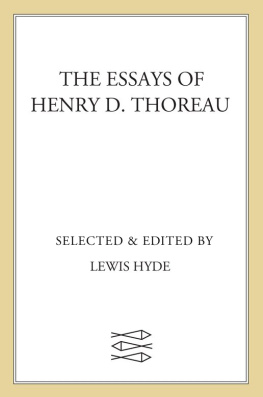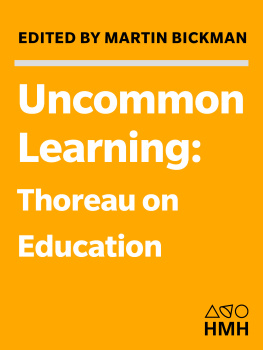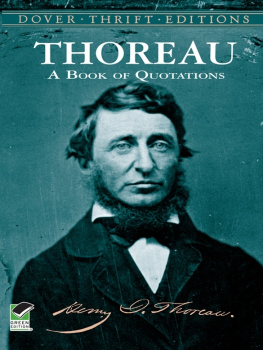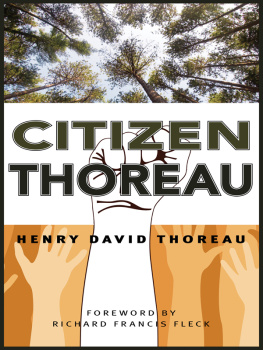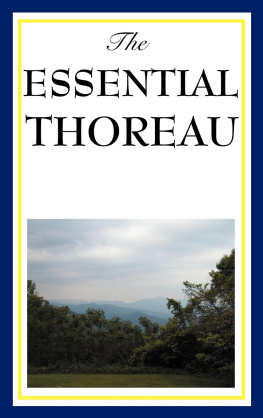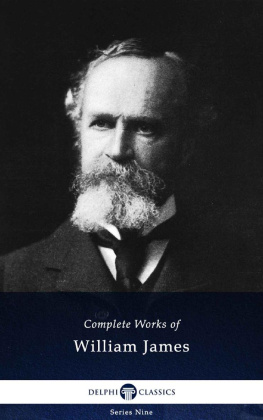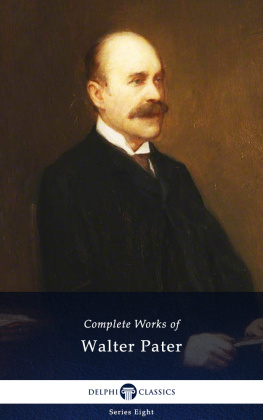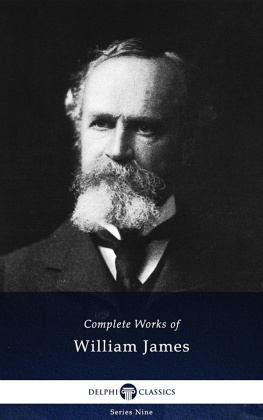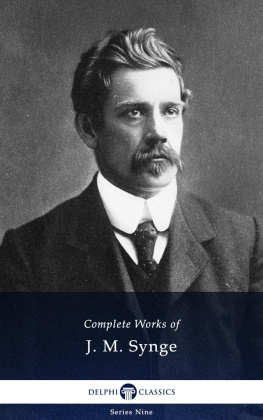
The Complete Works of
HENRY DAVID THOREAU
(1817-1862)

Contents

Delphi Classics 2013
Version 1

The Complete Works of
HENRY DAVID THOREAU

By Delphi Classics, 2013
The Books

341 Virginia Road, Concord, Massachusetts Henry David Thoreaus birthplace. He was born to modest New England parents John Thoreau, a pencil maker, and Cynthia Dunbar.

A sketch of the birthplace in 1897

The house in the late nineteenth century

Thoreau as a young man
A WEEK ON THE CONCORD AND MERRIMACK RIVERS

First published in 1849, this book is ostensibly the narrative of a boat trip from Concord, Massachusetts to Concord, New Hampshire and back, which Thoreau had taken with his brother John in 1839. As John had died from tetanus in 1842, Thoreau wrote the book as a tribute to his memory. The books first draft was completed while the author was living at Walden Pond. Upon completing the work, Thoreau was unable to find a publisher willing to take it on and so had it published at his own expense. Few copies of the book sold and Thoreau was left with several hundred extra copies, finding himself in debt.
While the book may appear to be a travel journal, broken up into chapters for each day, with some literal description of the journey from Concord, Massachusetts, down the Concord River to the Middlesex Canal, much of the text is in the form of digressions by the Harvard-educated author on diverse topics such as religion, poetry, and history. Thoreau relates these topics back to his own life experiences, often framed by the rapid changes taking place in his native New England during the Industrial Revolution, many of these being changes that Thoreau laments.

The first edition, of which less than 300 sold of the 1,000 copies printed
CONTENTS
FRIDAY.

The original title page
Whereer thou sailst who sailed with me,
Though now thou climbest loftier mounts,
And fairer rivers dost ascend,
Be thou my Muse, my Brother .
I am bound, I am bound, for a distant shore,
By a lonely isle, by a far Azore,
There it is, there it is, the treasure I seek,
On the barren sands of a desolate creek.
I sailed up a river with a pleasant wind,
New lands, new people, and new thoughts to find;
Many fair reaches and headlands appeared,
And many dangers were there to be feared;
But when I remember where I have been,
And the fair landscapes that I have seen,
Thou seemest the only permanent shore,
The cape never rounded, nor wandered oer.
Fluminaque obliquis cinxit declivia ripis;
Quae, diversa locis, partim sorbentur ab ipsa;
In mare perveniunt partim, campoque recepta
Liberioris aquae, pro ripis litora pulsant.
Ovid , Met. I. 39
He confined the rivers within their sloping banks,
Which in different places are part absorbed by the earth,
Part reach the sea, and being received within the plain
Of its freer waters, beat the shore for banks.
CONCORD RIVER.
Beneath low hills, in the broad interval
Through which at will our Indian rivulet
Winds mindful still of sannup and of squaw,
Whose pipe and arrow oft the plough unburies,
Here, in pine houses, built of new-fallen trees,
Supplanters of the tribe, the farmers dwell.
Emerson .
The Musketaquid, or Grass-ground River, though probably as old as the Nile or Euphrates, did not begin to have a place in civilized history, until the fame of its grassy meadows and its fish attracted settlers out of England in 1635, when it received the other but kindred name of Concord from the first plantation on its banks, which appears to have been commenced in a spirit of peace and harmony. It will be Grass-ground River as long as grass grows and water runs here; it will be Concord River only while men lead peaceable lives on its banks. To an extinct race it was grass-ground, where they hunted and fished, and it is still perennial grass-ground to Concord farmers, who own the Great Meadows, and get the hay from year to year. One branch of it, according to the historian of Concord, for I love to quote so good authority, rises in the south part of Hopkinton, and another from a pond and a large cedar-swamp in Westborough, and flowing between Hopkinton and Southborough, through Framingham, and between Sudbury and Wayland, where it is sometimes called Sudbury River, it enters Concord at the south part of the town, and after receiving the North or Assabeth River, which has its source a little farther to the north and west, goes out at the northeast angle, and flowing between Bedford and Carlisle, and through Billerica, empties into the Merrimack at Lowell. In Concord it is, in summer, from four to fifteen feet deep, and from one hundred to three hundred feet wide, but in the spring freshets, when it overflows its banks, it is in some places nearly a mile wide. Between Sudbury and Wayland the meadows acquire their greatest breadth, and when covered with water, they form a handsome chain of shallow vernal lakes, resorted to by numerous gulls and ducks. Just above Shermans Bridge, between these towns, is the largest expanse, and when the wind blows freshly in a raw March day, heaving up the surface into dark and sober billows or regular swells, skirted as it is in the distance with alder-swamps and smoke-like maples, it looks like a smaller Lake Huron, and is very pleasant and exciting for a landsman to row or sail over. The farm-houses along the Sudbury shore, which rises gently to a considerable height, command fine water prospects at this season. The shore is more flat on the Wayland side, and this town is the greatest loser by the flood. Its farmers tell me that thousands of acres are flooded now, since the dams have been erected, where they remember to have seen the white honeysuckle or clover growing once, and they could go dry with shoes only in summer. Now there is nothing but blue-joint and sedge and cut-grass there, standing in water all the year round. For a long time, they made the most of the driest season to get their hay, working sometimes till nine oclock at night, sedulously paring with their scythes in the twilight round the hummocks left by the ice; but now it is not worth the getting when they can come at it, and they look sadly round to their wood-lots and upland as a last resource.
Next page

